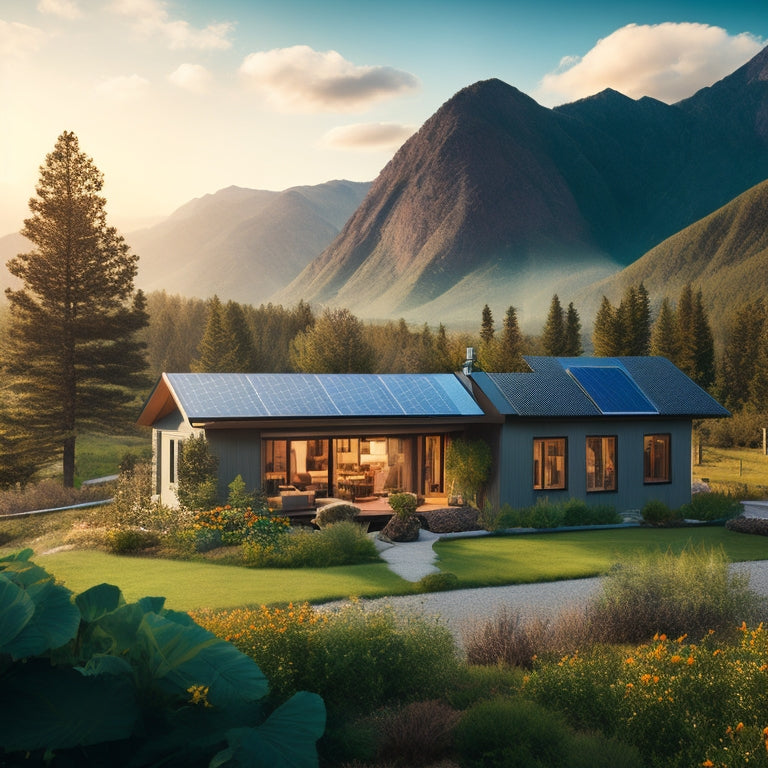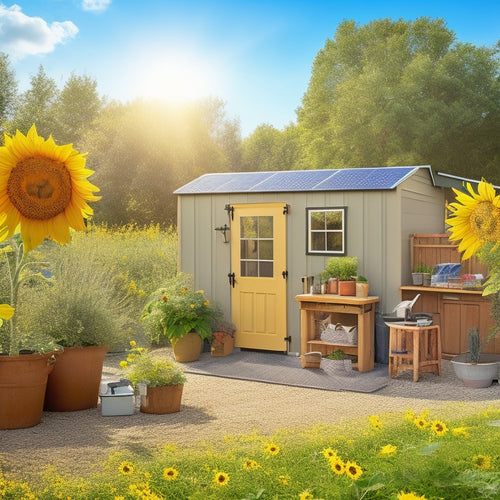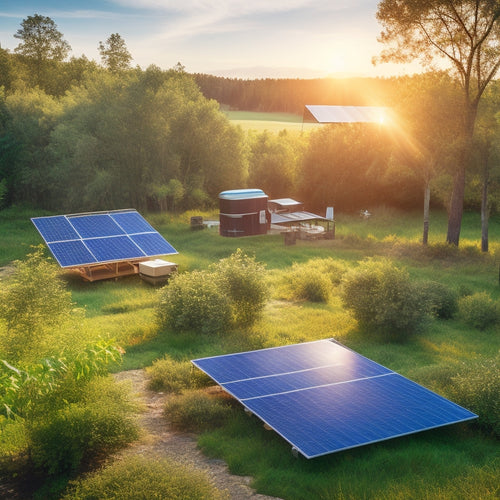
Best Home Power Supply Options for Off-Grid Living
Share
For off-grid living, the best power supply options are renewable energy systems like solar and wind. Solar panels efficiently capture energy, especially in remote areas, while battery storage, particularly lithium-ion types, guarantees you have power during off-peak times. Wind turbines are also beneficial, especially in areas with consistent winds. To maximize energy independence, calculate your daily energy needs and select the appropriate system size. Prioritize maintenance to keep your setup running smoothly. With the right combination of these technologies, you can achieve a sustainable and self-sufficient lifestyle. Investigate further for understanding on optimizing your energy solution.
At a Glance
- Solar power systems provide reliable energy capture and storage, essential for off-grid living, especially in remote areas with limited sunlight.
- Wind turbines are effective for generating sustainable energy in locations with consistent wind, complementing solar power sources.
- Lithium-ion batteries offer high efficiency and longevity, making them ideal for off-grid setups despite higher initial costs.
- Assess daily energy needs and peak load requirements to ensure the selected power supply system can handle consumption effectively.
- Initial investments in renewable energy solutions lead to long-term savings and contribute to an eco-friendly lifestyle.
Reliable Energy Independence
To achieve reliable energy independence, you'll want to take into account integrating renewable energy solutions like solar or wind power into your setup.
Choosing the right system design and efficiency is vital to maximizing energy production based on your specific needs.
Pairing these with efficient battery storage systems guarantees you capture and store energy for use when demand peaks or during cloudy days.
This combination not only minimizes reliance on external sources but also promotes a sustainable, eco-friendly lifestyle.
Renewable Energy Solutions
In the quest for reliable energy independence, renewable energy solutions stand out as the most viable option for off-grid living. Utilizing solar and wind power allows you to generate your own electricity, reducing reliance on traditional utilities.
When considering solar panels, it's vital to focus on solar panel efficiency—higher efficiency means you'll generate more energy from a smaller footprint, maximizing your space and investment.
Wind energy is another powerful ally in your off-grid expedition. Installing a wind turbine can provide supplemental energy, especially in areas with consistent winds.
However, keep in mind that wind turbine maintenance is essential to guarantee peak performance. Regular inspections and upkeep will help you avoid costly repairs and downtime, enabling you to maintain a steady energy supply.
Both solar and wind solutions are eco-friendly, minimizing your carbon footprint while offering you the freedom to live sustainably.
By investing in these renewable energy sources, you'll achieve energy independence, allowing you to thrive in your off-grid lifestyle without concern for fluctuating fuel prices or energy shortages.
Adopt these technologies, and equip yourself with the freedom to live life on your terms.
Battery Storage Systems
Utilizing the power of battery storage systems is vital for achieving reliable energy independence in an off-grid setup. By integrating a strong battery storage solution, you can utilize energy generated from renewable sources—like solar or wind—and store it for use when demand peaks or when sunlight and wind aren't available.
It's essential to choose batteries that align with your energy needs and lifestyle. Lithium-ion batteries, for instance, offer high energy efficiency and longevity, making them a popular choice. However, you must also prioritize battery maintenance; regular checks and balancing can extend battery life greatly, ensuring you maximize your investment.
Consider implementing a monitoring system to track your battery's performance and energy consumption. This way, you can optimize usage patterns, enhancing your overall energy efficiency.
Investing in quality battery storage not only strengthens your independence but also supports eco-friendly living. You're not just reducing reliance on the grid; you're actively participating in a sustainable lifestyle.
With the right system in place, you can enjoy the freedom that off-grid living promises, all while minimizing your environmental footprint.
Sustainable Energy for Remote Areas
When you're looking for sustainable energy options in remote areas, solar power systems and wind energy solutions are your best bets.
These technologies utilize natural resources, providing you with reliable energy while minimizing your impact on the environment.
Off-grid solar kits promote energy independence, allowing you to generate clean energy that meets your specific needs optimal kit sizing.
Solar Power Systems
For those seeking sustainable energy solutions in remote areas, solar power systems offer a reliable and efficient way to capture the sun's energy. By utilizing solar panel efficiency, you can notably reduce your reliance on traditional power sources and gain the freedom to live off-grid.
Start by evaluating your energy needs to determine the right size for your solar installation.
When considering solar installation tips, make sure you select high-efficiency panels that maximize energy capture, even in less than ideal weather conditions. Positioning your panels for optimal sunlight is essential; south-facing locations usually yield the best results.
Don't forget to include battery storage in your system to store excess energy for nighttime use or cloudy days.
Regular maintenance is key—clean your panels to keep them performing at their best. Investing in a solar power system not only provides you with energy independence but also contributes to a sustainable lifestyle.
With the right setup, you can enjoy the tranquility of remote living while knowing you're making eco-friendly choices. Adopt the power of the sun and take control of your energy future today!
Wind Energy Solutions
Utilizing the power of wind energy can greatly enhance your off-grid living experience. Wind turbines can offer a sustainable, reliable energy source, especially in areas where sunlight may be limited.
When selecting a wind energy solution, consider wind turbine efficiency, which is essential for maximizing your energy output. Look for models designed for small scale applications; these compact units can easily fit into your remote lifestyle without taking up too much space.
To get started, assess your location's average wind speed and direction. This data will help you choose the right turbine size and type, ensuring you capture maximum energy.
Installing a small wind turbine not only lowers your carbon footprint but also provides you with the freedom to generate your own power, independent from grid reliance.
Don't forget about the importance of battery storage systems to store excess energy generated during windy days. This way, you'll have power when the wind isn't blowing.
Key Specifications Overview
When choosing a power supply for your off-grid setup, understanding power output capacity is vital to meet your energy needs.
Proper system sizing and load calculation are fundamental to guarantee reliability and prevent overload or underload, as key components of off-grid systems play a significant role in optimizing energy harvesting.
You'll also want to investigate battery type options, as they play a significant role in efficiency and lifespan.
This knowledge equips you to make informed decisions that align with your eco-friendly goals.
Power Output Capacity
Understanding power output capacity is vital for selecting the right off-grid power supply that meets your energy needs. You'll want to guarantee that your chosen system can generate sufficient power output while maintaining high energy efficiency. Consider the appliances and devices you plan to run—this will help you determine the overall capacity you require.
Here's a quick overview of common power output capacities for off-grid systems:
| Power Output (W) | Ideal Use Cases | Energy Efficiency Rating |
|---|---|---|
| 1000 W | Small appliances, lights | High |
| 2000 W | Medium appliances, tools | Moderate |
| 5000 W | Larger appliances, HVAC systems | Moderate to Low |
| 10000 W | Whole house, heavy machinery | Low |
When you evaluate these options, keep in mind that higher power output may not always mean better energy efficiency. A balance of capacity and efficiency is essential to achieving the freedom and sustainability of off-grid living. Prioritize systems that align with your lifestyle and energy requirements so you can enjoy a seamless, eco-friendly existence.
Battery Type Options
Choosing the right battery type is just as important as determining power output capacity for your off-grid setup. You'll typically consider lithium and lead-acid batteries, each with distinct characteristics.
Lithium batteries offer significant advantages, like higher discharge rates, longer cycle lifespans, and lower battery maintenance requirements. They allow for deeper discharges without damaging the battery, making them an eco-friendly choice due to their efficiency and reduced environmental impact.
On the other hand, lead-acid batteries come with drawbacks. They've shorter cycle lifespans and are heavier, requiring more frequent maintenance. Their discharge rates can also be less impressive, limiting your power accessibility during high-demand periods.
When assessing your options, consider cost comparisons; lithium batteries generally have a higher upfront cost but can save you money over time due to their longevity and reduced maintenance.
Charging methods also differ, with lithium batteries requiring specific chargers, while lead-acid batteries have more flexible options.
Ultimately, selecting the right battery type will help you achieve the freedom and independence you seek in off-grid living, ensuring that your power supply meets your needs effectively and sustainably.
Selecting Based on Energy Demand
To choose the right power supply for your off-grid home, you first need to calculate your daily energy needs. This involves evaluating not just your average consumption but also your peak load requirements to guarantee your system can handle sudden surges.
Conducting a thorough energy audit will help you identify your appliances and their wattage, guiding you toward informed decisions that promote efficiency and sustainability.
Calculate Daily Energy Needs
Calculating your daily energy needs is crucial for effectively powering your off-grid lifestyle. Start by evaluating your energy consumption based on your appliances and devices. List everything you use, from refrigerators to lights, and note their wattage and usage hours. This will give you a clear illustration of your total energy demand.
Next, consider your lifestyle factors. Are you a weekend warrior or a full-time off-gridder? Your energy requirements will differ greatly. For instance, if you plan on running power tools or using heating systems, your needs will spike. Factor in seasonal changes too; longer days in summer can reduce lighting requirements, while winter may necessitate more heating.
Once you have these numbers, calculate your daily watt-hours by multiplying wattage by hours of use for each device. Sum these values to find your total daily energy needs.
This detailed approach not only enables you to choose the right power supply but guarantees you live sustainably and efficiently, maximizing your freedom in an off-grid environment. Remember, the more precise your calculations, the better your energy independence will be.
Assess Peak Load Requirements
When evaluating peak load requirements for your off-grid power supply, it's vital to contemplate the maximum energy demand your appliances might require at any given moment. This peak load analysis helps you identify the highest wattage needed when multiple devices operate simultaneously.
For example, if you plan to run a refrigerator, microwave, and a few lights at the same time, their combined energy consumption could exceed your power supply's capacity, leading to system failures or inefficiency.
To guarantee you're well-prepared, start by listing all your appliances along with their maximum wattage ratings. Next, consider how often and when these devices will be used together. This understanding allows you to choose a power supply that can handle these peak demands without compromising your energy independence.
Select equipment with a higher capacity than your calculated peak load to accommodate fluctuations and avoid stress on your system.
Lower Long-Term Costs
When considering off-grid power solutions, you'll want to weigh the initial investment against long-term savings.
While upfront costs for solar panels or wind turbines might seem high, these investments often lead to significant reductions in your energy bills over time.
Initial Investment vs. Savings
Investing in a home power supply for off-grid living may seem intimidating at first, but understanding the balance between initial costs and long-term savings can make the choice clearer. The upfront investment might be significant, but when you consider the financial incentives and the potential for reduced energy pricing, the decision becomes more appealing.
Here's a quick cost comparison to help with your budget planning:
| Initial Costs | Long-Term Savings |
|---|---|
| High upfront investment | Reduced utility bills |
| Installation expenses | Tax credits and rebates |
| Maintenance of systems | Lower energy costs |
| Financing options | Increased property value |
Through thorough return analysis, you'll see that while initial costs can be intimidating, the long-term savings often outweigh them. Calculating your investment returns can lead to greater freedom and sustainability in your off-grid lifestyle. By choosing the right power supply, you're not just making a financial decision; you're contributing to a more eco-friendly future. Welcome the adventure, balance your options, and enjoy the benefits of living off the grid.
Frequently Asked Questions
What Are the Maintenance Requirements for Off-Grid Power Supplies?
Maintaining off-grid power supplies requires regular battery maintenance and solar panel upkeep. You'll need to check connections, clean panels, and monitor battery levels to guarantee peak performance and sustainable energy independence for your eco-friendly lifestyle.
How Do Weather Conditions Affect Energy Production?
Weather's a fickle friend; it dances between sun and storm. Your solar efficiency dips with clouds, while wind variability can either lift you or leave you stranded. Stay adaptable to utilize nature's unpredictable energy gifts.
Can I Integrate Multiple Power Sources Together?
Yes, you can integrate multiple power sources together. Using solar hybrid systems enhances energy management, enabling you to optimize your energy production. This eco-friendly approach provides independence and guarantees a reliable power supply for your needs.
What Is the Lifespan of Off-Grid Power Systems?
Your off-grid power system's lifespan often mirrors a well-tended garden. Battery longevity hinges on energy efficiency; properly maintained systems can thrive for 10-25 years, granting you the freedom to utilize nature's power sustainably.
Are There Grants or Incentives for Off-Grid Energy Systems?
Yes, you can find federal incentives and state grants for off-grid energy systems. These financial supports help you invest in sustainable solutions, promoting both eco-friendly practices and your desire for energy independence. Investigate your options today!
Explore More
In your quest for energy independence, choosing the right home power supply is like picking the perfect tool for a job—it can make all the difference. By understanding your energy demands and exploring sustainable options, you'll not only reduce long-term costs but also contribute to a healthier planet. Welcome the freedom of off-grid living, and watch your sustainable choices enable your lifestyle. With the right setup, you'll be ready to thrive, no matter where you call home.
Related Posts
-

Building an Emergency Backup Solar Power System in 5 Essential Steps
Building an emergency backup solar power system involves five key steps. First, assess your daily energy needs to ide...
-

Solar Powered Lights for Sustainable Home Decor
Solar-powered lights offer a stylish and eco-friendly way to enhance your home decor. They capture sunlight, converti...
-

Top Off Grid Solar Batteries for Renewable Energy
When seeking top off-grid solar batteries for renewable energy, consider options with advanced battery chemistry, suc...


